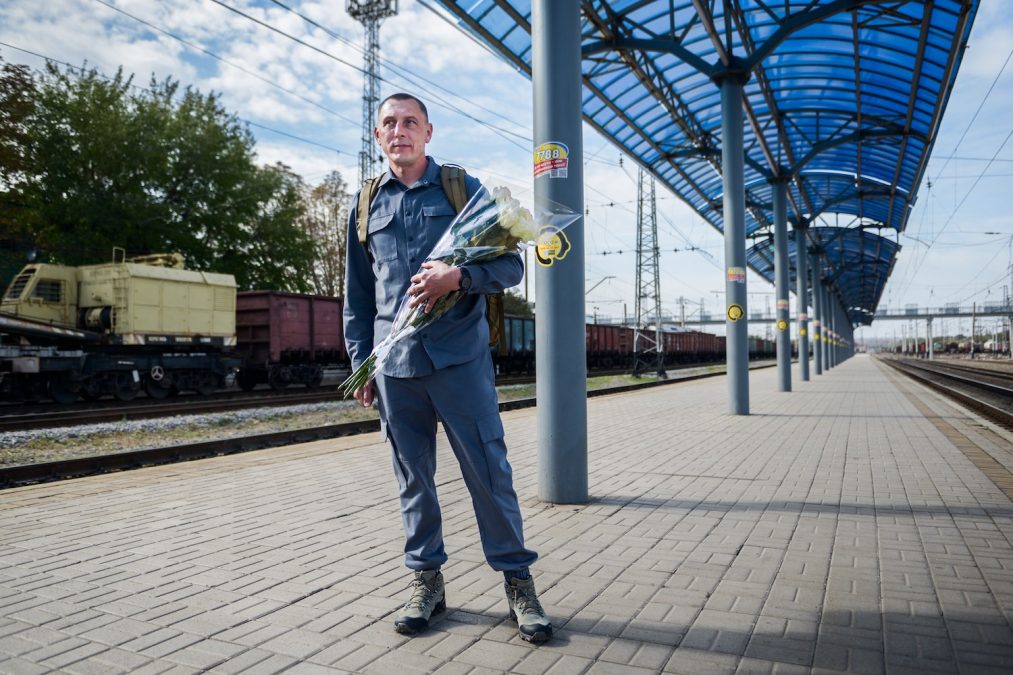‘I want to touch him more than I fear’ – How an industrial town became the romantic hotspot for war-couples in Ukraine
Thirty days. This is the amount of annual leave granted for a Ukrainian soldier. But what is the solution for those who want to see their loved ones throughout the rest of the year? They pay a visit to one of the few frontline towns with functioning railway stations, where soldiers get to meet their visiting partners for a precious day or two each month. We wanted to find out what keeps Ukrainian couples together, and to understand how Sloviansk, a small industrial town in the Donetsk region, has become a romantic hotspot. There are no functioning schools left, yet wedding spots and florists are up and running. As are apartments for rent. Lots of them. This reportage from October 2024 was first published in print in the third edition of Válasz Offline. The full story is now available in English – with Christmas and New Year updates. It sheds light on some of the most private details of Ukrainian couples’ lives, following nearly three years of the full-scale Russian invasion of Ukraine.
On a sunny October afternoon in the eastern Ukrainian town of Sloviansk a Ukrainian soldier in sky blue uniform stands patiently on the platform of the local train station – in his hands a bouquet of white roses.
Yevhenii, 42 from Poltava, has been serving in the Donetsk region, where some of the bloodiest fighting has been taking place since 24th February 2022. He was on the frontline just a few hours earlier, somewhere towards the East.
Soldiers like Yevhenii have their work cut out for them. Nearly three years into the full-scale invasion and with countless lives lost on both sides, the Russians are slowly but steadily gaining ground in Ukraine. Another brutal winter is also about to set in.
But right now Yevhenii has something else on his mind. His eyes light up as he is looking towards the direction of incoming trains from all over Ukraine. ‘I feel very excited to see her again, my Yulia.’
Desolation and balloons
Sloviansk, a small industrial town in the eastern Ukrainian Donetsk region lies about 25 kms from the frontline. The city, once home to at least 100 thousand inhabitants, now feels empty and worn out by the war. Schools, restaurants, cinemas and many local businesses have closed down or moved elsewhere. There are more soldiers than civilians on the street, and silent moments are rare compared to those filled with the sound of the air raid siren.
Sloviansk, however, is now filling in a new and vital role for Ukrainians. It has evolved into a popular romantic spot for soldiers coming in from the frontline to meet their partners from all over Ukraine. And the city’s economy has adapted to suit their needs.
Next to a military store and a shabby Vodafone shop in the city centre, a small Kvitka or florist has a selection of roses in a dozen colours. A shelf full of teddy bears and romantic cards is standing in the corner, with a red heart shaped balloon floating above it.
‘Everything has changed in Sloviansk. We used to be able to plan. Now we cannot even think as far as tomorrow’,
laments Sveta, the owner of the flower shop, while arranging pink roses on a small table. ‘But we are lucky, you see. There is a demand for flowers even in times of war. As long as our soldiers have girlfriends, we will not go out of business’, she adds.
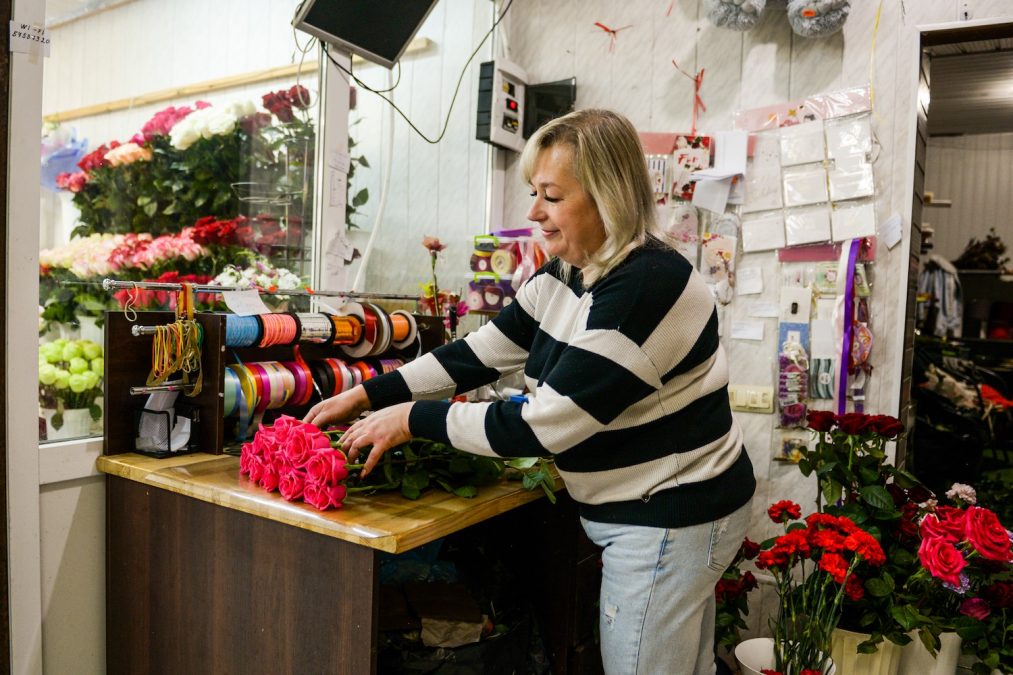
Sveta and her colleague Viktoriia are busy each morning, before the 13:20 Kyiv Express pulls into Sloviansk, packed with wives and girlfriends of soldiers. The train has become a town staple, boosting the local economy. ‘We get dozens of soldiers walking in in the morning. Most of them leave with carefully chosen bouquets or the occasional teddy bear. We also prepare regular flower deliveries for weddings’, Sveta explains.
| Expert opinion According to Svitlana Khuda, 45, a couple therapist from Vinnytsia, the number of marriages and divorces have both increased since 2022. ‘Times are uncertain, and planning is impossible. Therefore men and women easily jump into hasty decisions’, she says. Though therapy was not popular in Ukraine prior to the war, today many couples seek out therapists to help with issues like anxiety and emotional exhaustion. ‘With many men absent from home, women have to take on new responsibilities. They have to look after their children, take care of the household, but also make money. While these new roles strengthen some marriages, they also break others up’, Svitlana explains based on her own experience. ‘On a positive note, war also brings you closer to those you love, which is why we see an increase in marriages.’ Wedding services have also adapted to the war. A new app in Ukraine provides marital services for soldiers who want to remotely propose to their girlfriends. Should they receive a yes notification from their partners, they are able to proceed to tie the knot. Ukraine was already struggling with low birth rates before the full-scale Russian invasion. Since then the demographic crisis has worsened. In 2024, Ukraine was the very last country on the list of live births, with 6,0 out of a thousand (compared to Hungary’s lowest point in 2023 with 8,9). ‘It all comes back to the inability to plan for the future. Couples may get married, but starting a family is a long-term project. Many have to look after themselves and each other before even thinking about looking after a little one. Many babies are being born against all the odds’, Ms. Khuda adds. |
Back in Sloviansk, most soldiers get married in small, modest ceremonies. The event is often followed by a compulsory photoshoot with the newly-wed soldiers in their uniforms and brides in traditional, embroidered Ukrainian dresses.
Cafe Palermo, a few streets down from Sveta’s flower shop, has become a popular spot for wedding celebrations in Sloviansk. A big silver P decorates the front door, with a pink-purple sign right next to it. The waitress says they have hosted 4 weddings in the past month. ‘We hosted a big wedding party a few days ago, with a crowd of fifty people. The mood was great, we had flowers, balloons, all of it. Other times we organize smaller parties for the bride, the groom and a handful of guests. Life doesn’t stop.’
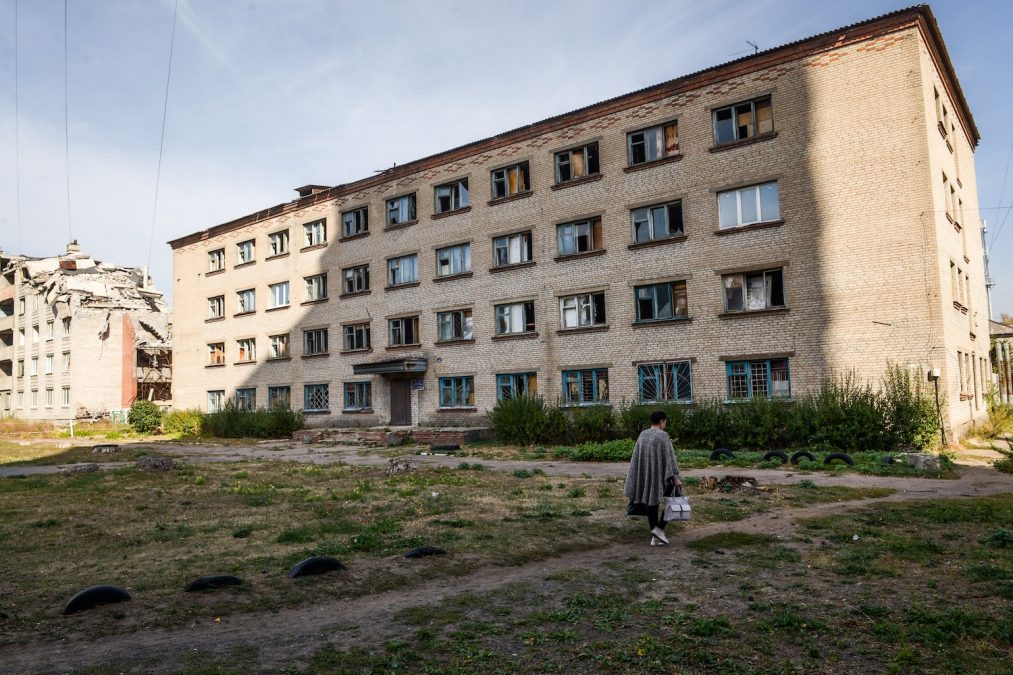
‘Do you understand what I am saying?‘
Meanwhile there is another economic mini boom in Sloviansk. The majority of hotel rooms and rented apartments are now taken by soldiers and their partners.
Liuda, 34, and her boyfriend Sasha are one of the many couples seeking solace in a hotel room on the outskirts of the city. They meet here once a month to spend a precious day or two together, whenever Sasha gets time off. ‘When we meet, we just want to spend all our time alone, walking in the park, cooking or lying around in bed. One time, Sasha took me on a surprise trip to a nearby town. It was very romantic’, says Liuda, who arrived just a few hours earlier on the famous Kyiv Express.
‘When time is so short, it is all about the simple things. Talking, touching and hugging. Before the war, we used to lay in bed and read to each other. We do the same now in the hotel.’ Liuda is now reading a book in a park outside the hotel, while her boyfriend is taking a nap after his strenuous night shift on the front.
The couple met 3 years ago, while volunteering. He joined the army in May 2023. ‘Our relationship didn’t start with big sparkles and pink clouds. It was difficult – we both had to learn how to trust ourselves and each other. We have been growing together and the war has made us grow even stronger as a couple’, she says. ‘But of course
when he decided to join the army, I cried. I cried a lot.‘
Liuda, just like thousands of other Ukrainian women, worries about the safety of her loved one every single day.
‘As a soldier, he is not allowed to share his location with me. It was really difficult to get used to that. Can you imagine not knowing where your boyfriend is? Not knowing whether he is okay?’
She says communication is key to maintaining their long distance relationship. Saying good morning and good night each day has become an important part of the routine. There are also the weekly calls, and sharing photos and videos to keep up a sense of normalcy. But with Liuda living in Kyiv and Sasha serving in Donetsk, distance remains a huge challenge for them too.
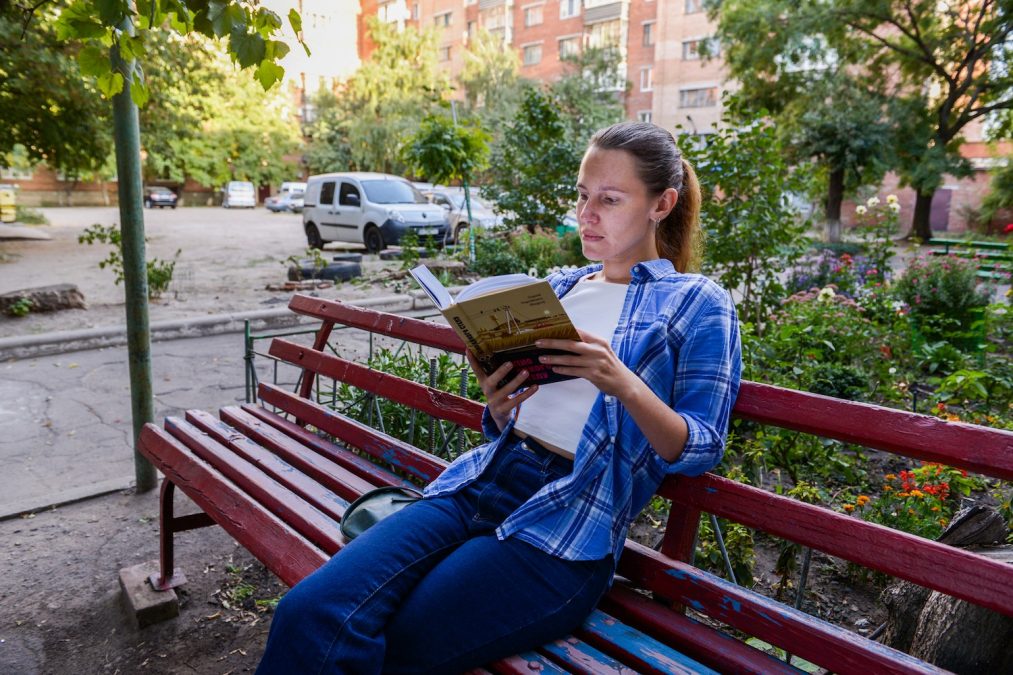
Taking a train to Donetsk seems like a risk in itself for many Ukrainian women. Train stations, as well as markets and hotels have been regularly targeted by Russians. In neighbouring Kramatorsk, a city 10 kms to the South, a missile smashed into its busy train station in April 2022, killing 63 people. In August 2024 another Russian Iskander targeted the Sapphire Hotel nearby, killing a journalist and injuring many others.
Liuda was nervous when visiting Sasha in Sloviansk for the first time. ‘Let me tell you a story. A few months ago I was getting ready for the early morning train in Kyiv to visit Sasha. I usually take a taxi to the station. That morning, around 4 am the city was attacked with a barrage of Russian missiles. I thought to myself – damn, taxis will stop operating again and I’ll have to walk to the station under the explosions. Do you understand what I am saying? I want to be with Sasha, to speak to him, to touch him, more than I fear.’
| How does Liuda spend the holidays? ‘I have no Christmas tree this year. Three years ago we made a tree with our own hands and decorated it with Sasha. He got some time off last year as well, so we celebrated together. That is what I am used to. But this year he didn’t get time off and I don’t feel like celebrating without him. I will probably spend both Christmas and New Years Eve with my family. But I am still quietly hoping that Sasha will come home for a few days…‘ |
Or the other way around
In a nearby market, two tall, blond soldiers are drinking coke and smoking Marlboro cigarettes next to a buffet table. Oleksandr and Maks have a few hours off before returning to duty on the frontline.
Oleksandr, 32, is a machine gunner in the army. He looks tough, and has been fighting in the thick of combat. But right now he is cheerfully talking about his family back home in Dnipro. The names of his wife and 11-year-old daughter are tattooed across his lower arm. ‘They are my everything.’
He then proudly shows a tattoo on his right hand’s ring finger. ‘This is the tattoo of my wedding ring. This way, I will never be able to lose it.’ He is soon scrolling through videos and photo montages of his wife Olena, and daughter, Viktoriia on his phone. Most photos are decorated with heart stickers, flowers and rainbow elements. He may have a tough exterior, but Oleksandr is a soft-hearted family man underneath it all.
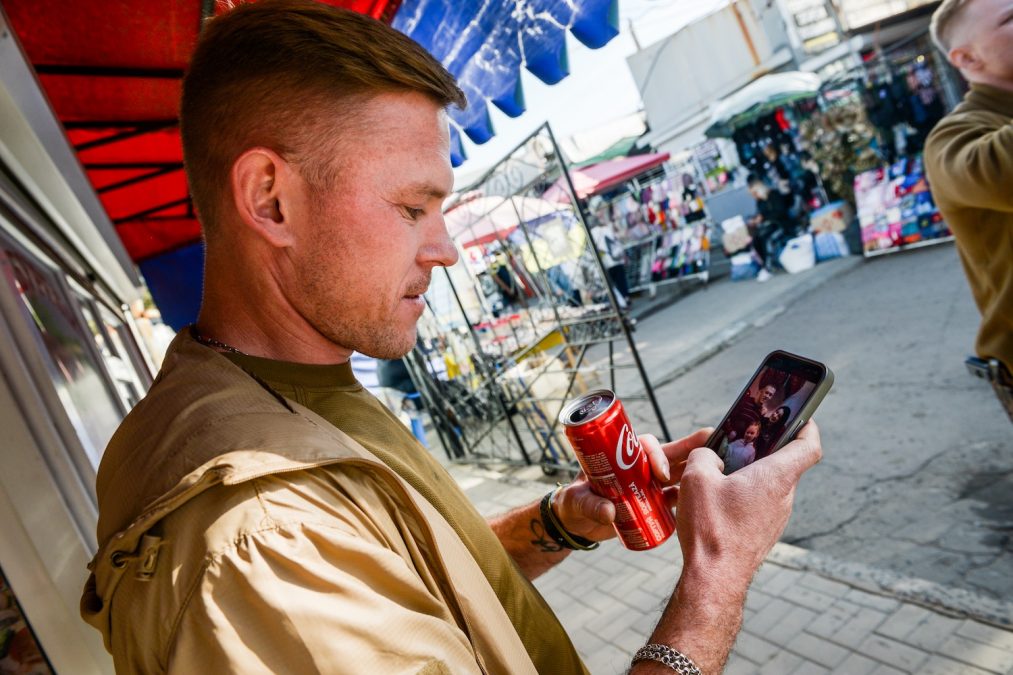
His fellow soldier, Maks, 30, is more reserved. He lights another cigarette before opening up. ‘I am single. It is really difficult to find the headspace for a relationship. I have enough problems as it is, I don’t need a woman to make my life even more difficult.’
He continues to tell a story about his comrade’s bad luck with women. ‘My buddy got severely injured on the front. His girlfriend was visiting him for 5 months at the hospital. In the sixth month, she decided she wouldn’t wait any longer. You see, sometimes soldiers are waiting on the platform, but their girlfriends no longer board the train. Or the other way around. They visit, but their husband is no longer around to greet them. We have heard of both’, says Maks.
‘We were making love all the time…‘
Alyona, 41, a former tourist guide, is lying with her new-born baby in the Okhmatdyt Children’s Hospital in Kyiv. (The hospital was hit by a Russian Kh-101 missile in July 2024. Wooden boards covering hundreds of blown out windows on the building serve as a stark reminder). Her boyfriend Artem, a former air conditioning technician turned into a soldier, visits them several times a week.
‘We dated and broke up many times before 2022. But once the full-scale war broke out, we got back together for good. Why? This is what war does to you. It teaches you to keep those you love closer, and let go of those you don’t need’, says the new mother.
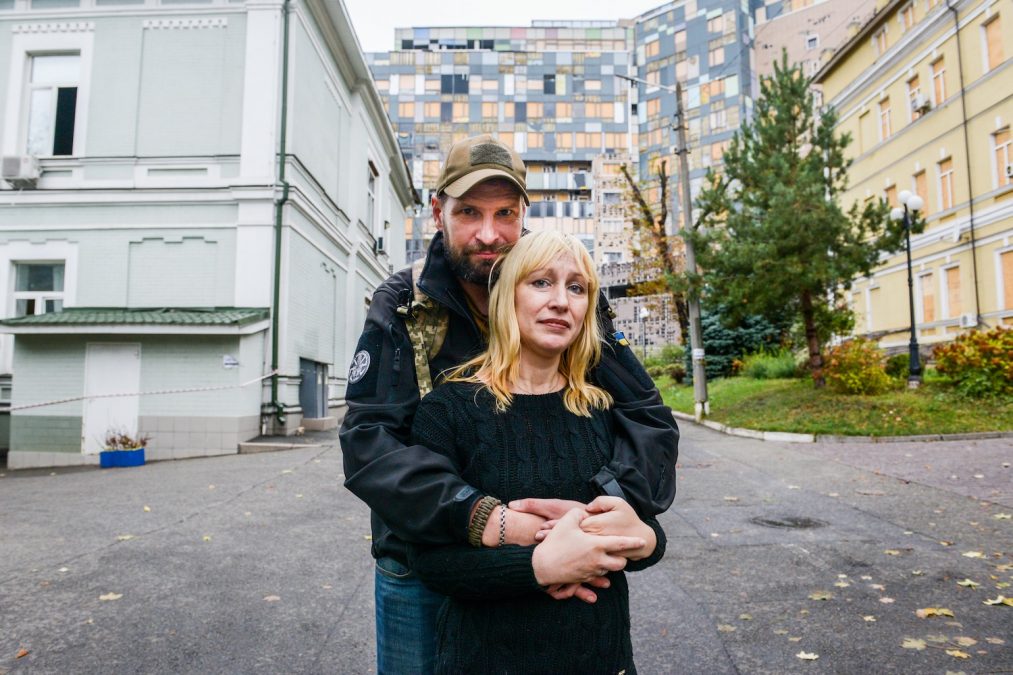
Just like Liuda, Alyona was visiting her boyfriend in Sloviansk too, where he would show up after weeks of fighting in the besieged city of Bakhmut. The couple would often have as little time as 24 hours, and they didn’t waste a precious minute.
‘We would make love all the time, and occasionally eat and sleep.’
Alyona wanted to start a family with Artem despite the war. ‘It was as good a time as any. Should things go wrong, a child would be the fruit of our love, forever reminding me of Artem.’ Nine months later baby Maksim was born.
| How does Alyona spend her holidays? ‘We are spending the holidays back home with my son, Maksim. I have been taking him to rehabilitation for the past weeks… but he also got baptized! Artem is now serving near Bucha, so we’re without him. He might need to return to the East in January and defend our country in the Bakhmut region.‘ |
Liuda thinks differently about family planning.
‘My boyfriend, Sasha, always talks about our future, about building a house with a pool in Odesa. Our kids could run around the pool one day. He likes to dream. But I cannot even think about planning a family right now. I cannot stand the thought of my child growing up without a father’, she says.
When asked about her future, she pauses to think. Tears start running down her cheeks. ‘You want to know what my dream is?’, she says. ‘My dream is just to be. Just to be with my Sasha without fear and uncertainty. But I do not dare to dream now.’
Back at the Sloviansk railway station, Yevhenii finally spots his fiancee Yulia as the Kyiv Express comes to a halt. His eyes follow her as she runs to the opening door. Then Yulia jumps into his arms.
The platform begins to fill up with couples embracing, before making their way to the exit of the railway station. ‘I will be back here tomorrow to say goodbye to my Yulia’, Yevhenii says. ‘But right now we have our precious 24 hours. That is all that matters.’
